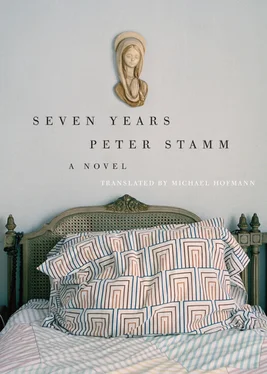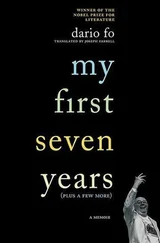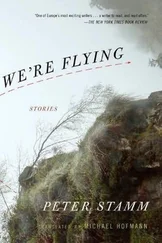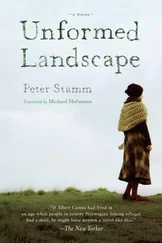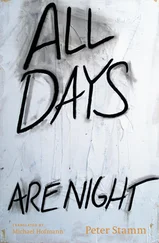I got up and went out into the hallway. I knocked gently on the door of Antje’s room and said quietly, Sonia? No reply. The door was half-open, and I went inside. Sonia was lying on the bed asleep, one arm curled over her head on the pillow. There was a small dark sweat stain in her armpit, the one flaw in an otherwise perfect picture. I stroked it with my finger, I didn’t dare any other touch. The Rolleiflex was on the desk. I picked it up and started to take pictures of Sonia. The image in the frame was reversed, and it took me a while to get used to the fact that every move I made had the reverse effect. Slowly I circled the bed, looking for the perfect setup, moving in and then back again. I took a couple of shots, once, when I was really near, Sonia’s brow creased at the sound of the shutter, and I was afraid she’d wake up, but her face relaxed again, and I went on taking pictures. Then the film was full, and I took it out, sealed it, and laid it with the other rolls that Sonia had shot that morning. As I was about to leave the room, I heard Sonia’s drowsy voice call my name. I turned around and went back to her. I must have gone to sleep, she said. I said I’d dozed off as well.
Sonia said she was going to take the films to be developed, would I like to go with her. We went to the photo shop down the street and then we had a drink in a bistro in the old harbor.
The next day Sonia wanted to take a look at the Château d’If. Antje had told us that boats went from there to a couple of small islands where you could bathe in the sea. We packed our swimming things, bought a few sandwiches, and picked up the prints in the photo shop.
The boat left from the old harbor. Even though it was early in the morning, bathers thronged the jetty. When the ship left port, it crossed various little fishing boats and farther out an enormous ferry that was probably coming from Corsica or from North Africa. The light and the salt smell and the ships reminded me of family holidays, and I felt a bit like I used to then, at once lost and full of expectation.
Not many passengers got off at the Château d’If, most of them were staying on till the bathing islands. The fortress fascinated me right away with its monumentality and its deployment of simple forms. It consisted of a quadratic central structure, with three massive towers at the corners. It had been built five hundred years ago, and had been used, almost from the start, as a prison. The central keep had a small inner courtyard with a well and galleries, from which you gained access to the cells. The cells were dark, with very little light reaching them through the narrow, low-set archery slits. Sonia said the walls were ten or twelve feet thick in places, and she began copying some of the details into her sketchbook. I tried to imagine what it would be like to be imprisoned here. Oddly, I had a sensation of shelter and protection rather than confinement.
On the castle roof, the light was dazzlingly bright and threw sharp black shadows onto the reddish stone. You could see the city in the distance, but the land was already so hazy that you could only make out the outlines of the buildings. After an hour we took the boat out to the islands. It was full of tanned young people in plastic flip-flops and bathing suits and not much more.
The ship docked at Frioul, the first of the islands. At the jetty a little train stood by to transport the visitors to the beach, but Sonia first wanted to look at the ruins of the German fort on a cliff overlooking the harbor. We climbed the rocky path. The heat was stifling, and when we got to the top, I was in a lather of sweat, and took off my T-shirt. Sonia seemed unaffected by the heat, she still looked fresh as a daisy. Paul Virilio compared these bunkers to grave sites, she said, while she walked among the ruins. He said it was as though the men went freely to their graves, to protect themselves from death. We had reached the highest point, and on the horizon there was a collection of concrete crosses. As we approached, we saw that they weren’t part of some military cemetery, but supports that must once have sustained something heavy, like a roof or antiaircraft artillery. Even so, the crosses lent a sort of morbid aspect to the place. Virilio calls the bunkers temples without religion, said Sonia.
On the way downhill, she asked me if I was religious. She wasn’t happy with my reply, my views were too diffuse and frivolous for her liking. You had to have a standpoint. She believed in people and humanity and progress. You’re just a child of the modern age, I said, and Sonia laughed and said, that to her was a compliment. I thought of something Le Corbusier had said, that I’d seen in a vitrine in the Cité Radieuse: Everything is different. Everything is new. Everything is beautiful . And for a moment I thought I could believe in that.
The little beach at the foot of the hill was too crowded for us, but not far off we found a bay with fewer people. The rocks were jagged, and we searched for a while before we found a flat spot where we could spread our towels. It was sheltered, and the air carried a faint smell of mold. Fifty yards offshore a couple of yachts rode at anchor, with no one to be seen on them. I put on my swimming trunks, Sonia sat down without changing. Won’t you come for a swim? I asked. She shook her head and said she preferred swimming pools, she was afraid of jellyfish and sea urchins and various other sea creatures.
I had to clamber over some rocks to get to the water, which seemed surprisingly cool for the time of year. I swam out a few yards. Looking back, I saw Sonia taking the photograph envelopes out of her bag. I swam as far as the yachts, rounded them, and turned back. Sonia was sitting there just as before, staring out to sea. When I dropped onto the towel next to her, she took the pictures that had been in her lap and handed them to me without a word. I dried my hands and looked through them, photos of the Cité Radieuse, other buildings, and places in the inner city. Then there were the pictures I had taken of Sonia asleep. They weren’t as good as I had hoped they would be, but Sonia still looked very good in them, almost like a statue. I turned to her. She had lain down and shut her eyes, it was almost as though she was imitating the pictures, but her attitude had something stiff about it. She had drawn up her legs and was pressing her knees together, and she seemed very young. I think she was waiting for me to kiss her, at any rate it didn’t seem to surprise her when I did. She put her arms around my neck and pulled me down to her.
We walked hand in hand back to the jetty, not saying a word. Sometimes I stopped and pulled Sonia toward me and kissed her. My mood was a mixture of formal and light-hearted. I had thought a lot about Sonia, and she probably had about me. We hadn’t kissed out of some whim, and it was clear to me from that moment on that the kiss was a decision we had come to together. On the boat back, Sonia asked me what my plans were, and whether I wanted to do a training course abroad, and later start my own architectural firm and family. We spoke lightly, but under everything there was the seriousness with which only young people talk about life. I didn’t feel so much in love as happy and confident and maybe proud.
Outside the apartment Sonia kissed me again, a short, concluding kiss, as if to make it clear to me that our relationship was to be kept secret from Antje. But in the course of the evening, we gave up our discretion. We had dinner on the balcony again, and were sitting there talking about architecture and Marseilles. Sonia said she hadn’t just come here for Le Corbusier. She also wanted to look for an internship. She had a couple of addresses of firms that interested her, and was going to go around and look at them. If you don’t mind, she said, taking my hand. Antje raised her eyebrows and smirked. Well, at least I’ll have my bed to myself tonight, she said. She looked at Sonia. Or won’t I? No one said anything, and I think even Antje was a little embarrassed by the silence. Maybe Sonia and I were too well acquainted to become lovers just like that. When going swimming I had often enough changed in her presence, but now when I thought about sleeping in the same bed with her, I felt a little bashful. With a quiet, uncertain voice, she said if it was okay with Antje, she would like to stay in her room. She got up, kissed me — as if by way of compensation — quickly on the mouth, and disappeared into the apartment. After she had been gone a little while, I followed her inside. I found her in Antje’s room. She was sitting on the bed, crying. I sat down next to her and put my arm around her, and asked her what the matter was. I’m so happy, she said, but I’m embarrassed. Embarrassed with me? No, silly, not you, in front of Antje. I was pretty sure she felt embarrassed in front of me as well, and maybe even with herself too. It doesn’t matter, I said. We’ve got all the time in the world.
Читать дальше
